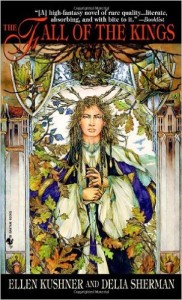 Rachel Manija Brown is the author of this review.
Rachel Manija Brown is the author of this review.
The Fall of the Kings, by Ellen Kushner and Delia Sherman, may not be the best fantasy novel of the year; I haven’t read one that’s better, but China Miéville’s The Scar is its equal, and the year is not yet over. But I feel confident in saying that, on a sentence-by-sentence level, it’s the best-written fantasy novel of the year.
Though it contains some violence, some tragedy, and some disquieting material of a thought-provoking nature, the book as a whole seems designed to evoke and provoke pleasure. I don’t mean that it panders, but that it gives every indication of having been conceived and executed in joy and delight. Kushner and Sherman are partners in life as well as collaborators, so that may well have been the case.
This is a book of witty dialogue, prose as precise as a blow to the heart and as glittering as the sword that dealt it, gorgeous young men and women to suit any taste, hot and elegant sex to suit any sexual persuasion, magic with a true aura of numinous danger, thrilling fights, thrilling scholarly debates, old books, swashbuckling aunts, exquisite clothing, ancient rituals, hot chocolate, female pirates, erotic paintings, expensive jewelery, political intrigue, taverns, ghosts, true love, true kings, and a convincing demonstration of the importance of first sources in historical research.
Looking over that list, I could imagine that the book was written specifically to suit my tastes, except that I would have sacrificed some of the sex to make room for more swordfighting.
The Fall of the Kings is a sequel to Ellen Kushner’s splendid fantasy of blades and manners, Swordspoint, but it won’t harm your understanding of the former if you haven’t read the latter. If you have read it, you’ll have a better sense of the world’s history and complexity, of changes good, bad, and ambiguous, and you will get at least one chill and one joke that will not be accessible to the Swordspoint-deprived.
Fans of the earlier book may recall the young aristocrat Michael Godwin, who studies the sword and learns the ways of power; the master swordsman Richard St. Vier; and St. Vier’s lover Alec, whom Michael Swanwick memorably dubbed “the boyfriend from Hell.” The Fall of the Kings, which is set fifty years later, features a cameo appearance by an elderly Michael Godwin, and one of its two protagonists is Alec’s son, Theron. St. Vier also makes an appearance, of sorts, but I won’t spoil it.
The city of Riverside was once ruled by kings who kept wizards as counselors, but that was many years ago. It’s now run by a council of lords. The kings of old are now believed to have been tyrants and madmen, and their wizards charlatans. Riverside is a classy University town where talk of restoring kings is as much silliness as treason, and everyone knows there’s no such thing as magic.
The young professor Basil St. Cloud takes up two pursuits which turn out to be inherently linked: he begins an affair with Alec’s son Theron Campion, and he decides to prove via research and logic that the wizards practiced genuine magic. Ancient magic begins to color Basil’s and Theron’s lives; their personalities become subsumed into the archetypes of the Wizard and the King. Meanwhile, Theron’s family, Basil’s students, and an assortment of spies, lords, professors, and former and hopeful lovers maneuver to stop them, help them, save them, or kill them.
There is an unusual amount of ambiguity, for a fantasy novel, as to whether the plan to revive the old magic and kingship is really a good idea. Is a True King — and the social upheaval one would bring — an improvement over a council that seems no more incompetent or tyrannical than most modern governments? Is any magic, however powerful, useful, or even necessary, worth the substitution of a grand and impersonal Wizard for an intense and very human professor?
Kushner and Sherman do not answer those questions, though they wrap up the plot in a most satisfactory fashion. The Fall of Kings doesn’t have as much emotional punch as Swordspoint, but it’s more coherent, and every bit as thought-provoking, well-written, and fun. And, appropriately for its college setting and emphasis on history and the scholarly method, it leaves one with much to consider after the book is closed.
(Bantam Doubleday Dell, 2002)
